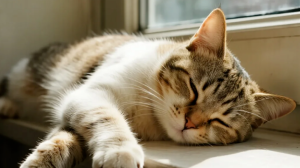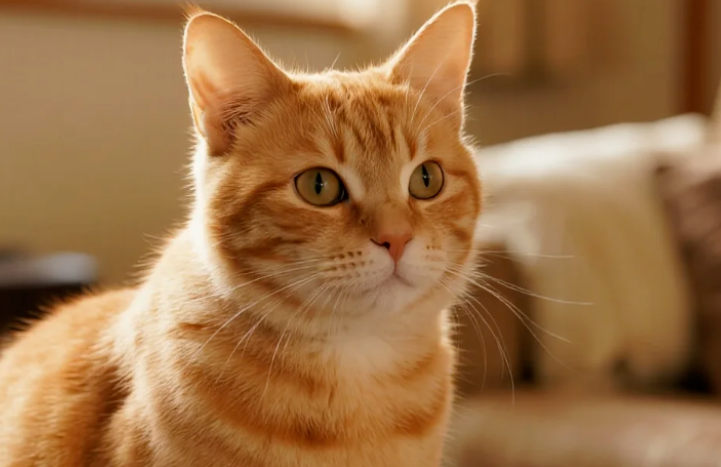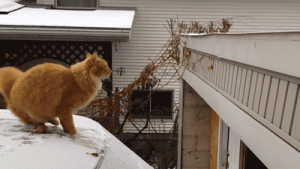-
A Cat’s Emotions Are Straightforward
I always say, cats don’t lie. They aren’t skilled in human diplomacy, nor do they understand flattery. All their affection is written in their body language. Their tail, eyes, footsteps, and scent trail—these are all clues. Look, they’re waiting for you by the door without any need for words. When they slowly walk across the couch, with their tail tip curled like a little hook, it’s like a tiny flag declaring their feelings.
-
Five “Unconcealable” Signals
First, an upright tail with a slight curl at the tip. This is the classic posture when they see their favorite person. In the feline world, a raised tail means friendliness, approachability, and anticipation. Especially when they walk while holding their tail upright, it’s an invitation for interaction.Second, slow blinking. They offer you their eyes—half-closed, slowly shutting, then gently opening again. This gesture signifies trust and relaxation. You can return the slow blink to show that you’ve received their gentle message.Third, rubbing their head, winding around your legs, or nudging your hand. Many people think they’re just scratching an itch, but actually, they’re mixing scents. By marking you with their cheeks, forehead, and sides, they’re claiming you as “one of their own.” When a cat is willing to wear your scent, they’re inviting you into their small family.Fourth, choosing to sleep within your “safe radius.” They might not sleep in your arms, but they’re always within a meter of you. They may even nap with their back to you, showing their belly. Turning their back doesn’t mean indifference—it’s a sign of total trust, surrendering their back to you.Fifth, speaking to you directly. Their voice softens, with the pitch rising at the end, or they respond with little chirps. These tones are usually reserved for those they’re closest to. They know you understand them, and they want you to hear them.
-
Small Actions Hold Big Secrets
Have you ever been “kneaded” by a cat? That’s a childhood memory coming alive. They see you as a source of safety and comfort. When they bring their favorite toy and place it near your feet, that’s them “giving you a gift.” They follow you to the bathroom, sitting guard at the door—not out of curiosity, but because they’re patrolling. When you’re anxious, they might curl up on your chest, breathing in sync with you. This isn’t a superpower, it’s their way of calming you with their warmth and rhythm.
-
Why They Choose Only You
Three key factors: scent security, predictable rhythm, and respect for boundaries. Scent security means you don’t constantly change your strong perfumes or cleaning products; your scent is a stable home to them. Predictable rhythm means feeding times, litter box cleaning, play sessions, and sleep routines follow a consistent schedule. Respecting boundaries means you don’t force cuddles when they’re not in the mood or drag them out of a corner when they seek solitude. A cat that feels respected will gravitate toward you.

-
Want to Be “Chosen”? Just Do This
Lower your gaze and height. Squat down to their level. Extend your fingertips, not your whole hand. Let them make the first move, then it’s your turn. Establish two small routines: 15 minutes of high-quality playtime daily, followed by 5 minutes of winding down. This gives them an outlet for excitement and a calm return. Add a fixed phrase before mealtime, like “Dinner’s ready!” These little rituals will associate you with their sense of security. Leave a bit of your scent behind. When the seasons change, place a worn T-shirt in their bed. This works especially well when moving or being away for a short time. Use treats to reinforce good behavior. When they approach, look at you, or respond to your call, give a small treat or offer 3 seconds of gentle petting. A predictable cause-and-effect relationship will turn you into the person they want to be near.
-
Three Steps to Repair a Relationship
When a new cat arrives, or if you’ve moved homes or had a negative experience, begin with spatial separation. Give them a small room that’s just theirs, complete with food, water, and litter. The second step is scent swapping. Wipe a soft cloth over their cheeks, then gently rub your hands, door handles, or corners of the couch with the same cloth. The third step is positive associations. Feed them through a door crack, play with them through the door, or spend short periods in the same room. Don’t rush it. Let the connection between “being near you” and “good things happening” form naturally.
-
Don’t Mistake Silence for Lack of Love
When it’s hot, they might stay away from you to cool down. In the changing seasons, they may seek higher ground to observe their surroundings. If they suddenly reduce interaction, curl up in a “bread loaf” position, frequently hide, lose appetite, or obsessively lick a certain spot, it’s not “giving up on you”—it’s a sign they’re not feeling well. At this point, keep track of changes in their eating, drinking, and litter habits, and seek veterinary care promptly. The cat you love also needs you to stand by them when they’re vulnerable.
-
Be Their Anchor
Love isn’t about being clingy. Love is quiet reliability—it’s the confidence of knowing, “You’ll be there.” A cat gradually entrusts you with their most vulnerable parts. Your job is to be worthy of that trust. Be punctual, gentle, and honest. Don’t be dismissive, and don’t boast. They don’t need you to be a superhero; they only need you to be their safe harbor.
If your cat has already chosen you as their favorite person, you’ve probably seen that little tail light up like a lighthouse in front of you. If you’re still waiting for that beam of light, don’t worry—just start with those small actions I mentioned earlier. Cats don’t lie. The person they love most has long stopped hiding it. They’re either already waiting by the door or making their way toward you. Today, start with a slow blink. When you return, let me know which signal they gave you.





